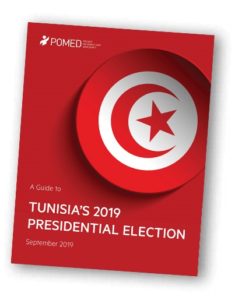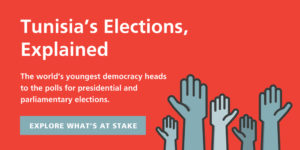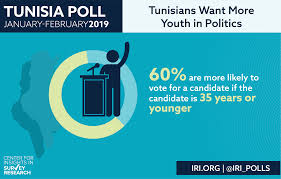 Tunisians headed to the polls on Sunday in their second free and fair presidential election. The election was exceptionally competitive, with no candidate in a crowded field of 26 garnering more than 20% of the vote. Official results will be released on Tuesday, but exit polls by both Sigma Conseil and Emrhod Consulting point to a shocking victory for two political outsiders: Kaïs Saïed and Nabil Karoui, notes analyst Sharan Grewal.
Tunisians headed to the polls on Sunday in their second free and fair presidential election. The election was exceptionally competitive, with no candidate in a crowded field of 26 garnering more than 20% of the vote. Official results will be released on Tuesday, but exit polls by both Sigma Conseil and Emrhod Consulting point to a shocking victory for two political outsiders: Kaïs Saïed and Nabil Karoui, notes analyst Sharan Grewal.
As I argued in February, the conditions were ripe for the emergence of populist outsiders. Eight years into the Arab Spring, Tunisia’s successive governments had failed to deliver on the primary demand of the revolution: economic opportunity, he writes for Brookings‘ Center for Middle East Policy:
By almost every metric, the economic situation was even worse than that which led to the 2011 revolution. Unemployment, roughly 12-13% pre-revolution, had jumped to 18% in 2011 and remains at 15% today. Inflation, 3-4% pre-revolution, has doubled to 7%. The rate of economic growth, around 5% pre-revolution, struggles to reach 2% today.

Carnegie
These difficult economic conditions have contributed to frustration with not just the ruling parties but the entire political system. The 2014 constitution established a semi-presidential system where executive power is shared between the president and the head of government, a divided system that has produced five years of slow governance and compromise solutions. Meanwhile, perceptions of corruption have risen, and support for democracy has declined.
Law professor Kais Saied received 19 percent of the vote, according to the preliminary figures, DW adds. Nicknamed “Robocop,” for his abrupt, direct way of speaking and rigid posture, Saied has also eschewed joining a political party and mass campaign rallies, barely spending money and preferring to meet voters door-to-door.
“I am first in the first round and if I am elected president I will apply my program,” he told French news agency AFP after claiming the victory.
 The International Republican Institute (IRI) and the National Democratic Institute (NDI) joint election observation mission deployed during Tunisia’s presidential elections will release their preliminary findings on Monday, September 16, 2019 at 3:00 p.m. CET.
The International Republican Institute (IRI) and the National Democratic Institute (NDI) joint election observation mission deployed during Tunisia’s presidential elections will release their preliminary findings on Monday, September 16, 2019 at 3:00 p.m. CET.
Delegation leaders IRI President Dr. Daniel Twining, Former Member of Parliament for the Scottish Labour Party Margaret Patricia Curran and NDI Middle East and North Africa Director Leslie Campbell will present the preliminary statement on behalf of the delegation. Translation services will be provided in Arabic and French and individual interviews will be available after the press conference.

International Republican Institute
The findings within the preliminary statement are based on the observation of the 32-member NDI/IRI international delegation, eight long-term observers and seven core team members who have been deployed since mid-August and will stay in Tunisia until the election processes are completed. NDI and IRI – partners of the National Endowment for Democracy – have also conducted repeated rounds of public opinion research in the months and years leading up to the election that have also informed the observers’ findings.







